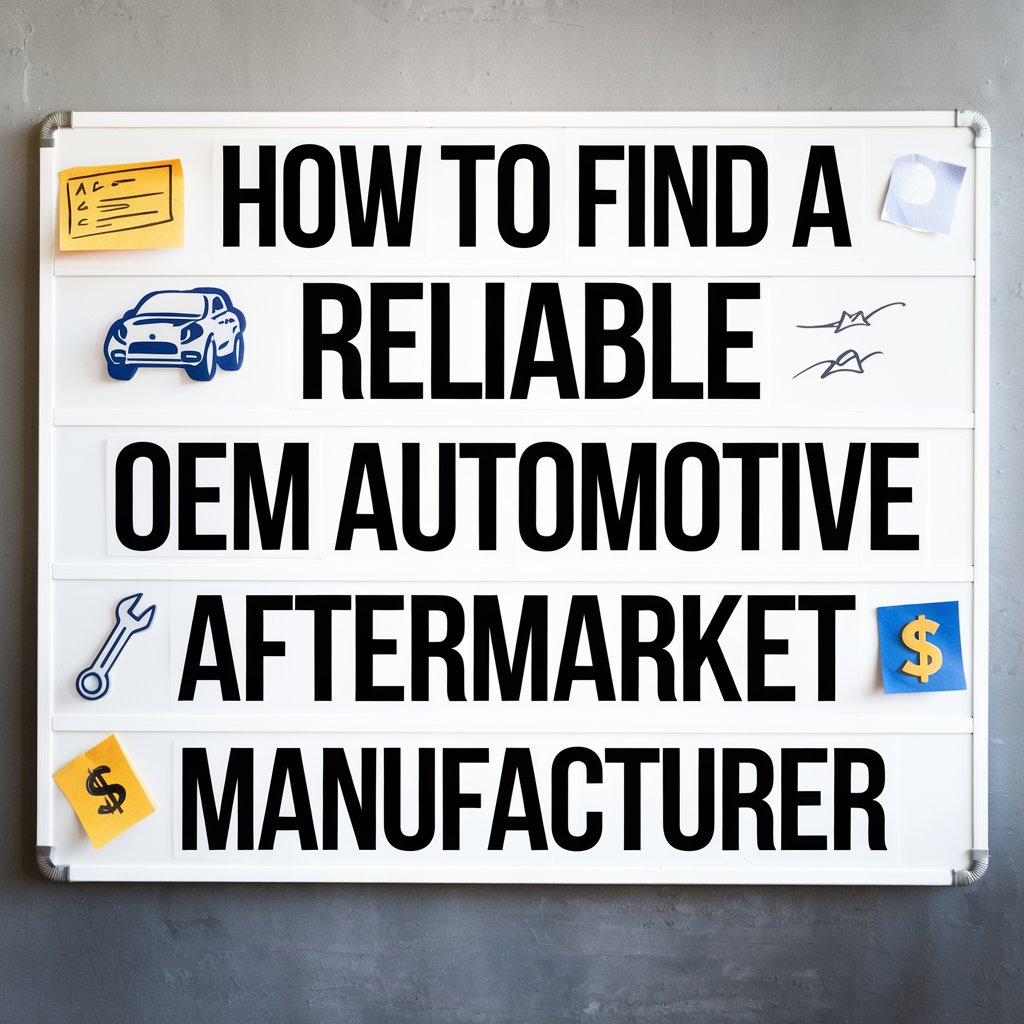Navigating the vast world of automotive aftermarket parts can be daunting, especially when it comes to identifying manufacturers who offer OEM-quality components. A reliable manufacturer not only ensures the longevity and performance of your vehicle but also offers peace of mind through enhanced safety and compatibility. This guide aims to provide practical steps and tips to help you find a trustworthy OEM automotive aftermarket parts manufacturer, ensuring you get the best value and quality for your automotive needs.
Understanding OEM and Aftermarket Parts
When you’re shopping for car parts, you’re likely to encounter two terms frequently: OEM (Original Equipment Manufacturer) and aftermarket. Understanding the distinctions and overlaps between these types of parts is crucial for making informed decisions about the best options for your vehicle.
What Are OEM Parts?
OEM parts are components made by the original manufacturer of your car or by a company specifically contracted by the car manufacturer. These parts are identical to those that came with your vehicle when it rolled off the assembly line. They’re designed with the exact specifications set out by the car manufacturer, ensuring a perfect fit and function.
Advantages of OEM Parts:
- Perfect Fit and Ease of Replacement: Since these parts are essentially the same as the ones your vehicle originally came with, they’re guaranteed to fit without any modification.
- Maintained Warranty: Using OEM parts typically won’t affect your car’s warranty.
- Higher Quality Assurance: These parts must meet the quality standards of the car manufacturer, which can mean greater assurance of durability and performance.
Disadvantages of OEM Parts:
- Higher Cost: OEM parts generally come with a higher price tag compared to aftermarket parts.
- Limited Availability: Sometimes, these parts can be harder to find, as they are only available through authorized dealerships.
What Are Aftermarket Parts?
Aftermarket parts are produced by different companies from those that manufactured the original parts. These companies do not have any contract with the car maker, and these parts are often designed to fit a range of different car models, not just a single vehicle.
Advantages of Aftermarket Parts:
- Cost-Effective: Generally, aftermarket parts are less expensive than OEM parts, which can make them more appealing if you’re working with a tight budget.
- Variety: There is a wide range of aftermarket parts available, offering varying levels of quality and price, which provides more options for the consumer.
- Accessibility: These parts are usually easier to find and can be purchased at a variety of outlets, including online stores and independent shops.
Disadvantages of Aftermarket Parts:
- Variable Quality: The quality of aftermarket parts can vary widely from one manufacturer to another. Some may match OEM parts in quality, while others may not perform as well or last as long.
- Potential Warranty Issues: Using aftermarket parts may void the warranty of your car if the part fails and causes damage to the vehicle.
- Overwhelming Selection: The vast selection can be confusing, making it difficult to choose the best part from multiple options.
Making the Choice
When choosing between OEM and aftermarket parts, consider the specific needs of your vehicle and your personal preferences regarding cost, quality, and warranty considerations. If quality and compatibility are your top priorities and budget is less of a concern, OEM parts may be the best choice. However, if you’re looking for value or a part that performs better than the original, aftermarket parts can be a highly effective option.
The key is to research manufacturers and suppliers to determine the quality and reliability of the parts they offer, whether OEM or aftermarket. This ensures that any part you choose not only fits your budget but also meets or exceeds your expectations in terms of performance and longevity.
Key Factors to Consider When Choosing a Manufacturer for OEM Automotive Aftermarket Parts
When selecting a manufacturer, metal casting processes, customized services for OEM automotive aftermarket parts, several crucial factors must be considered to ensure you receive high-quality components that meet your needs. Here’s a comprehensive guide to help you make an informed decision.
1. Reputation and Industry Standing
- Track Record: Look for manufacturers with a proven track record of reliability and quality in producing aftermarket parts. Established companies are likely to have refined manufacturing processes and a commitment to maintaining standards.
- Customer Reviews: Explore customer testimonials and reviews to gauge satisfaction levels and common issues. Positive feedback is a good indicator of quality and reliability, while frequent complaints can signal potential problems.
- Industry Recognition: Awards, certifications, and recognition from industry bodies can further validate a manufacturer’s standing and reliability.
2. Quality of Parts
- Material Quality: Ensure the manufacturer uses high-grade materials that match or exceed the specifications of the original equipment. Inferior materials can lead to premature part failure and safety risks.
- Manufacturing Processes: Understand the technology and processes used in the production of the parts. Advanced manufacturing techniques like CNC machining, precision forging, and quality casting are indicators of high-quality production.
- Quality Control Measures: Check if the manufacturer has stringent quality control measures in place. This includes regular testing and inspection throughout the production process to eliminate defects and ensure consistency.
3. Certifications and Compliance
- Industry Certifications: Look for certifications such as ISO 9001, which indicate that a manufacturer meets international standards for quality management systems.
- Compliance with Safety Standards: It’s crucial that the parts meet all relevant safety and environmental regulations. Compliance with standards like the Automotive Aftermarket Industry Association (AAIA) can provide added assurance.
4. Product Range
- Variety of Offerings: A manufacturer with a broad range of products can be a one-stop-shop for all your aftermarket needs, which is particularly useful for businesses looking to consolidate their supply chain.
- Innovation in Product Development: Check if the manufacturer regularly updates their product lineup with the latest advancements in automotive technology, offering more sophisticated and efficient solutions.
5. Customer Support and Services
- Technical Support: Good manufacturers provide strong technical support, including assistance with installation, troubleshooting, and other inquiries.
- After-Sales Service: Effective after-sales services such as guarantees, warranties, and easy return policies reflect a commitment to customer satisfaction and product reliability.
- Availability of Parts: Ensure that the manufacturer maintains a robust supply chain that facilitates timely deliveries and minimizes downtime caused by shortages.
6. Cost-Effectiveness
- Pricing: While price should not be the only criterion, it is important to ensure that the costs are competitive and provide good value for money.
- Economic Order Quantities: Some manufacturers offer discounts for bulk orders, which can be beneficial for larger operations or resellers.
7. Sustainability Practices
- Environmental Responsibility: Manufacturers that adhere to environmentally friendly practices in their production processes not only help reduce your carbon footprint but also align with global trends and consumer preferences towards sustainability.
- Use of Recycled Materials: Some manufacturers use recycled materials in their parts, which can be a selling point for environmentally conscious consumers.
Steps to Finding a Reliable OEM Automotive Aftermarket Parts Manufacturer
Finding a reliable manufacturer for OEM automotive aftermarket parts is crucial for maintaining high standards of quality and ensuring customer satisfaction. Here’s a step-by-step guide to help you identify a trustworthy supplier that meets your needs.
Step 1: Conduct Thorough Research
- Online Searches: Begin with a simple online search to list potential manufacturers. Visit their websites, read about their history, and understand their market presence.
- Industry Publications and Reviews: Utilize automotive industry magazines, journals, and online forums to gather information about the reputation and reliability of manufacturers. Reviews and testimonials provide insights into customer satisfaction and potential issues.
- Trade Shows and Exhibitions: Attending industry trade shows and exhibitions allows you to meet manufacturers directly, examine their products firsthand, and discuss specific requirements.
Step 2: Evaluate Their Expertise and Experience
- Years in Business: Longevity in the industry can be a sign of experience and reliability.
- Specialization: Look for manufacturers specializing in the specific types of parts you need. Specialization often indicates deeper expertise and a focus on quality.
- Past Clients and Case Studies: Review case studies or seek information about past clients to assess the manufacturer’s ability to handle projects similar to yours.
Step 3: Assess Quality Assurance Processes
- Certifications: Verify that the manufacturer holds relevant certifications such as ISO 9001 or any other industry-specific standards that pass the quality requirements.
- Quality Control Procedures: Inquire about their quality control measures throughout the manufacturing process. This includes material inspection, in-process checks, and final product testing.
- Sample Testing: If possible, arrange to test a sample product to evaluate its quality and compatibility with your needs.
Step 4: Check Scalability and Flexibility
- Production Capacity: Ensure the manufacturer can meet your volume requirements without compromising on quality, especially during peak demand periods.
- Response to Customization Requests: Determine their ability to adapt products to fit specific needs or to innovate solutions in response to new market trends.
Step 5: Understand Their Supply Chain and Distribution Network
- Logistics and Delivery: Analyze their distribution network to ensure they can deliver products efficiently and punctually, reducing potential downtimes.
- Supply Chain Transparency: A transparent supply chain is a good indicator of a manufacturer’s ethical practices and reliability.
Step 6: Review Support and Communication
- Customer Service: Good customer service is essential. The manufacturer should be responsive, helpful, and capable of providing comprehensive support before, during, and after purchase.
- Communication Channels: Effective communication channels are crucial. Ensure that you can easily reach the manufacturer through multiple platforms (phone, email, chat) for queries and support.
Step 7: Compare Pricing and Terms
- Competitive Pricing: While the cheapest option isn’t always the best, ensure that pricing is competitive and aligns with the market standards for the quality offered.
- Payment Terms: Review their payment terms to ensure they are favorable for your business’s cash flow and financial planning.
- Warranty and Return Policies: Understanding the warranty and return policies is crucial in case of defective or unsatisfactory products.
Step 8: Visit the Facility
- Factory Visit: If possible, visit the manufacturing facility to get a firsthand look at their operations, the work environment, and their staff. This can provide invaluable insights into their operational standards and product quality.
Step 9: Make a Decision
- Gather and Review Information: Collate all the information and feedback gathered through the above steps.
- Risk Assessment: Consider potential risks and how they may impact your business.
- Final Selection: Choose the manufacturer that best meets your quality requirements, budget, and operational needs.
Conclusion
Choosing the right OEM automotive aftermarket parts manufacturer is crucial for maintaining the high standards demanded in today’s competitive automotive market. When selecting a partner for your manufacturing needs, it’s vital to assess their capabilities, processes, and the added value they can bring to your business. A manufacturer like Taiyuan Simis Investment Casting Co., Ltd., with its comprehensive range of metal casting processes and a strong focus on quality and customer service, stands out as an exemplary choice.
Taiyuan Simis Investment Casting Co., Ltd. excels in various metal casting techniques, including investment casting, sand casting, shell mold casting, and die casting. These diverse casting capabilities allow them to handle a wide range of product specifications and material requirements, making them versatile enough to meet the diverse needs of the automotive aftermarket. Whether you require intricate lightweight structures or large, durable components, Taiyuan Simis has the technology and expertise to deliver high-quality parts that meet your exact standards.
Furthermore, Taiyuan Simis Investment Casting Co., Ltd. is not just about casting metals; they offer customized services tailored to the unique needs of each client. This includes in-house tooling, which significantly reduces production lead times and costs, and rapid prototyping, which is essential for accelerating product development and market entry. Such services ensure that your specific part requirements are met with precision and efficiency, from concept to final product.
Quality is paramount at Taiyuan Simis Investment Casting Co., Ltd. Their commitment to excellence is demonstrated through rigorous product testing and inspection, ensuring that every part conforms to the highest quality standards before it leaves the factory. This dedication to quality is further affirmed by their ISO 9001 accreditation, which underscores their adherence to international quality management practices.
In choosing Taiyuan Simis Investment Casting Co., Ltd. as your manufacturer, you partner with a company that not only provides comprehensive casting solutions and custom services but also values quality and customer satisfaction above all. This partnership ensures that you receive reliable, high-performance parts that contribute to the success of your automotive products, ultimately enhancing your competitive edge in the market.




